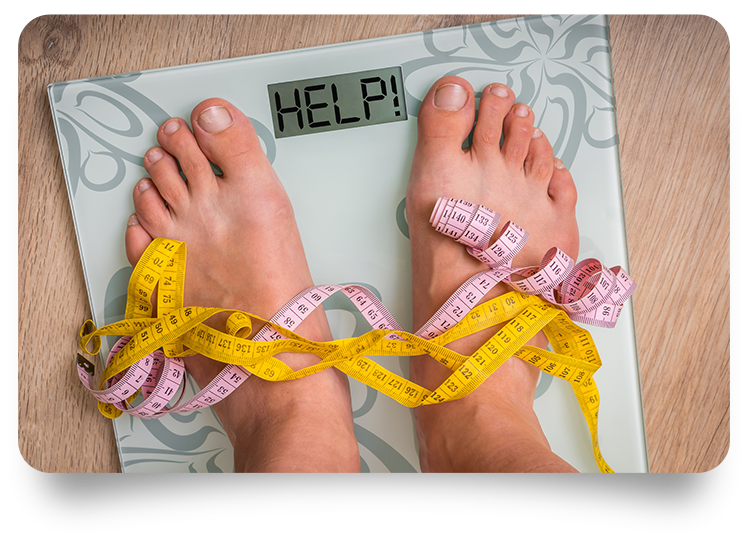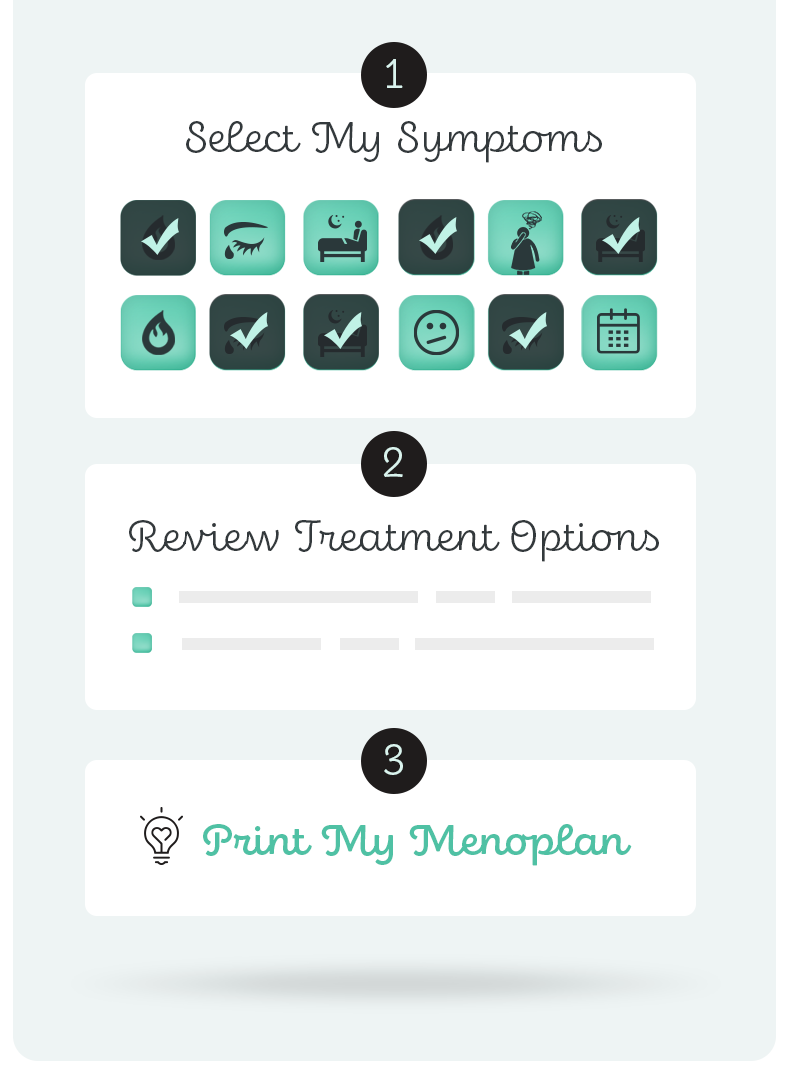Treatments
HEALTHY DIET
A nutrient-rich diet has been shown to promote positive aging. Don’t we all want to retain our independence as we age? By diet, we mean a pattern of eating and drinking certain types of foods more than others. The whole pattern matters. It turns out that the nutrients in food often rely on one-another to be absorbed by our bodies. Researchers are still learning when nutrients are more bio-available, examining what forms of cooking (or eating it raw) are best, which foods are synergistic with each other.
Studies suggest that post-menopausal women who eat a Mediterranean diet weigh less and have a smaller waist circumference than women who eat a diet of meat-and-potatoes, refined grains, and few nuts. But that doesn’t tell us whether changing your diet will avoid or roll back menopause-related weight gain. More high quality research is needed.
See our sections on specific nutrients – vitamins, omega-3s, herbals and supplements, and soy for a summary of their impact on symptoms of menopause.
Even if the research is not clear for menopause symptoms, there are many other reasons to follow a healthy diet. Healthy diets like the Mediterranean diet and DASH diet can help prevent heart disease, diabetes, cancer, and inflammation. A healthy diet may play a role in cognitive aging, but more research is needed.
- The Mediterranean diet emphasizes fruits, vegetables, whole grains, lean meats and fish, and olive oil. There have been many studies showing that people who follow a Mediterranean diet have better health markers than those who do not. You can customize your own food plan based on the Mediterranean diet at: https://www.myplate.gov/life-stages/adults.
- The DASH diet is similar to the Mediterranean diet, but is low in sodium. It was developed to prevent high blood pressure. Researchers funded by the National Heart, Lung, and Blood Institute developed it, and many studies have supported it’s healthy effects.
- The MIND diet is based on the Mediterranean and DASH diets, but specifically includes eating berries (for the polyphenols) and green leafy vegetables. It was developed by researchers for the National Institute of Aging (the same group that funded this website) to increase consumption of foods that may prevent dementia and cognitive decline. While some studies with adults over 65 show that the MIND or Mediterranean diet has a small effect on cognitive aging, the evidence is weak. More MIND diet studies are underway, including research on middle age adults.
WEIGHT LOSS STRATEGIES
Weight loss is a billion-dollar industry. There’s no magic pill or supplement, despite the ads and the “weird tips” out there. Even if you lose weight on a diet, you are at risk of gaining it back, as your body adjusts to a new metabolism at the lower weight.
Generally, experts recommend an initial goal of 10 percent of your body weight if you are overweight or obese. If your current diet is poor, and you significantly improve the quality of your diet by switching to a Mediterranean or similar diet, you may lose 10 pounds quickly. In studies of weight loss interventions, people often lose about 1-2 pounds a week by following a healthy diet and eating fewer calories.
There’s an app for that! There are many free apps that can help you monitor your diet. There are also many devices that can track the calories you burn during the day, and link it to your food/calorie monitoring app. So you’ll know if you are taking in fewer calories than you use. Keeping the weight off, though, is a challenge for the vast majority of women.
One of the best, free, resources out there is a free useful mobile app called MyPlate, and an associated interactive website. The tools tailored the info, so you know what a healthy diet would be for you. It’s run by the U.S. Department of Agriculture, and reflects the latest nutrition and health science.
Other places we recommend for free, trustworthy information about strategies to lose weight are sponsored by the National Institutes of Health:
- https://www.nhlbi.nih.gov/health/educational/lose_wt/
- https://www.niddk.nih.gov/health-information/weight-management.
(If the links are broken, search for nih.gov and weight loss.)
If you are obese, talk to your doctor about medical strategies that may help. Diet alone is insufficient to lose weight because of metabolic syndrome.
OUR BOTTOM LINE: DOES IT HELP?
SOMETIMES DIETARY CHANGES HELP YOU LOSE WEIGHT. Improving your diet can help you lose weight, if you have a poor diet. Reducing calories can reduce your weight, but permanent weight loss is difficult. If you are obese, you may need a medical intervention to lose weight and reset your metabolism.
YES. For women who are obese, weight loss reduces the number of urinary incontinence leaks. Weight loss if you are overweight or obese can also help with some sleep problems. Being overweight or obese is also linked to having more problematic symptoms of menopause in general.
MAYBE. Weight loss may help some women with their hot flashes and night sweats. It may also help with some aches and pains, due to the toll excess weight can put on your bones and muscles. More research is needed to know the conditions under which weight loss would help with these symptoms, and how much weight would need to be lost to make a difference.

WEIGHT GAIN

BLADDER CONTROL PROBLEMS

SLEEP PROBLEMS & INSOMNIA

HOT FLASHES AND NIGHT SWEATS

ACHES AND PAINS

DRY EYE
POTENTIAL RISKS & SIDE EFFECTS
Switching to a healthy diet – such as the Mediterranean, DASH, or MIND diet – is not risky. Diets that severely restrict calories should only be done under the supervision of a doctor, because they can harm your body. Before paying for a commercial diet plan or supplements, check for side effects and what is known about how long it is safe for your body to follow that plan. You want to avoid depriving yourself of necessary nutrients or conversely taking so much of a nutrient or chemical that it harms you. When in doubt, ask your doctor. Starting an exercise routine is not risky for most people, but check with your doctor if you have any chronic conditions.
IF I WANT TO TRY THIS TREATMENT WHAT ARE MY NEXT STEPS?
Start with the MyPlate website, to learn more about a healthy diet tailored for you.
Gold EB, Crawford SL, Shelton JF, et al. Longitudinal analysis of changes in weight and waist circumference in relation to incident vasomotor symptoms: the Study of Women’s Health Across the Nation (SWAN). Menopause. 2017;24(1):9-26. doi:10.1097/GME.0000000000000723
Greendale GA, Sternfeld B, Huang M, et al. Changes in body composition and weight during the menopause transition. JCI Insight. 2019;4(5):e124865. Published 2019 Mar 7. doi:10.1172/jci.insight.
Huang AJ, Subak LL, Wing R, West DS, Hernandez AL, Macer J, Grady D; Program to Reduce Incontinence by Diet and Exercise Investigators. An intensive behavioral weight loss intervention and hot flushes in women. Arch Intern Med. 2010 Jul 12;170(13):1161-7. doi: 10.1001/archinternmed.2010.162. Erratum in: Arch Intern Med. 2010 Sep 27;170(17):1601. PMID: 20625026; PMCID: PMC3030922.
Kroenke CH, Caan BJ, Stefanick ML, et al. Effects of a dietary intervention and weight change on vasomotor symptoms in the Women’s Health Initiative. Menopause. 2012;19(9):980-988. doi:10.1097/gme.0b013e31824f606e
Molina-Leyva I, Molina-Leyva A, Riquelme-Gallego B, Cano-Ibáñez N, García-Molina L, Bueno-Cavanillas A. Effectiveness of Mediterranean Diet Implementation in Dry Eye Parameters: A Study of PREDIMED-PLUS Trial. Nutrients. 2020;12(5):1289. Published 2020 May 1. doi:10.3390/nu12051289
Romagnolo DF, Selmin OI. Mediterranean Diet and Prevention of Chronic Diseases. Nutr Today. 2017;52(5):208-222. doi:10.1097/NT.0000000000000228
Sayón-Orea C, Santiago S, Cuervo M, Martínez-González MA, Garcia A, Martínez JA. Adherence to Mediterranean dietary pattern and menopausal symptoms in relation to overweight/obesity in Spanish perimenopausal and postmenopausal women. Menopause. 2015 Jul;22(7):750-7. doi: 10.1097/GME.0000000000000378. PMID: 25513984.
Thurston RC, Ewing LJ, Low CA, Christie AJ, Levine MD. Behavioral weight loss for the management of menopausal hot flashes: a pilot study. Menopause. 2015;22(1):59-65. doi:10.1097/GME.0000000000000274
https://www.nhlbi.nih.gov/health/educational/lose_wt/recommen.htm
Authors: Dr. Katherine Newton, & Dr. Leslie Snyder. Last reviewed February 15, 2021



